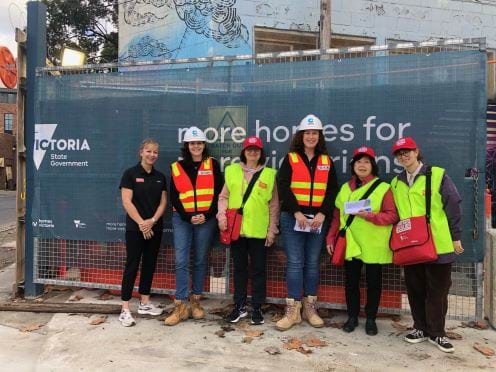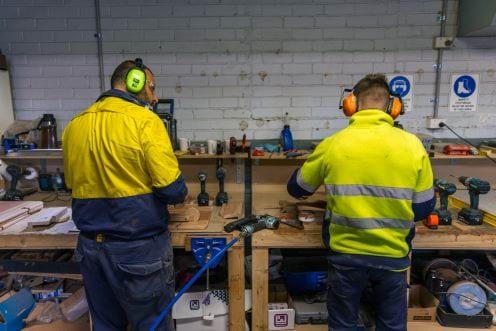Opportunities for disadvantaged Victorians
No Victorian was left untouched by the COVID-19 pandemic. However, some groups were affected more than others and continue to need support to recover from the social and economic impacts. The Framework steers employment opportunities being created in the pandemic recovery economy to Victorians experiencing disadvantage.
Creating jobs is crucial, as good, stable employment that pays a fair wage provides not only income, but dignity, resilience and connection.
The Framework supports social enterprises right across the state to generate employment opportunities and help Victorians experiencing disadvantage transition into long-term, stable employment.
By strategically leveraging its spending, the Victorian Government is creating an economy in which all Victorians can find their space to flourish.
Key Achievements
From 1 July 2021 to 30 June 2022, the Victorian Government directly spent:
- $24.6 million with 112 certified social enterprises. Of this, $14.9 million was spent with 33 certified social enterprises with a mission for people experiencing disadvantage
- $40 thousand with certified social enterprises through the Print Management and Associated Services state purchase contract
- $87.1 million with 272 social enterprises identified by the Map for Impact project. Of this, $43 million was spent with 129 social enterprises identified by Map for Impact, with a mission for people experiencing disadvantage
This year there was significant growth in engagement and expenditure with the Victorian social enterprise sector:
- 137% increase in expenditure with certified social enterprises
- 75% increase in the number of certified social enterprises engaged
The launch of the second Victorian Social Enterprise Strategy 2021–2025 in October 2021, which aims to grow the social enterprise sector, strengthen its connectivity and unlock the potential to create more jobs and deliver enhanced economic and social value to the Victorian community, may have contributed to the increase in engagement and expenditure with social enterprises.
Compared to the inaugural reporting year 2018–19, there has been a 60% increase in engagements and a 237% increase in expenditure with certified social enterprises.
Victoria’s Social Procurement Framework is a crucial driving force behind the growth of the Victorian social enterprise sector. There’s a reason that 54% of social enterprise procurement activity is happening in Victoria. It’s the catalyst that encourages industry to engage in social procurement and then embed it in their business over time. And as spend with social enterprises increases, they continue to grow and create wide-ranging impact for the most marginalised people in our communities. It’s this kind of progressive approach that will help build a values-led economy and make social enterprise business as usual. We are proud to continue working in partnership with the Victorian Government. Victoria’s framework is a leading example to showcase with other state governments and through international networks.
Case Study: Homes Victoria – Icon and The Big Issue Women’s Workforce
Social enterprises play an important role in providing transitional employment for Victorians experiencing disadvantage as a pathway to employment in mainstream businesses. One aim of the Opportunities for disadvantaged Victorians objective is to increase supply chain opportunities for social enterprises that support Victorians experiencing disadvantage with employment opportunities.
The re-development and construction of more than 1,100 new homes at social housing sites in Brighton, Flemington and Prahran provided Homes Victoria with an opportunity to engage a supplier who could meet their social procurement targets as part of the Ground Lease Model project.
Homes Victoria partnered with a consortium of businesses to implement their Ground Lease Model, that enabled them to lease public land to the consortium, which has and will continue to finance, design, and construct the new social housing. After completion of the construction phase, the community housing provider will manage and maintain the sites for 40 years before handing the land and all dwellings back to Homes Victoria.
In Phase One, Homes Victoria engaged one of Australia’s largest construction providers, Icon, to manage the construction works. Icon was required to inform the local community about upcoming construction work in their area. To meet the social procurement targets within their contract, Icon engaged The Big Issue Women’s Workforce (The Women’s Workforce) to undertake newsletter distribution.
The Women’s Workforce was established as a social enterprise in 2010 to help provide safe, female-friendly employment opportunities to women experiencing marginalisation and disadvantage, often as a result of long-term unemployment. The Women’s Workforce has employed 180 women to date across a wide range of projects.
The partnership with Homes Victoria began in June 2021, creating employment opportunities for 9 long-term unemployed women and totalling 77 hours of work assisting with printing, mailing and letterbox drop services of works notifications and newsletters during 2021–22. With a total spend of $20,500 across the 2021–22 financial year, The Women’s Workforce was able to create multiple employment opportunities for women who were previously excluded.
Employment with The Women’s Workforce has enabled these women to improve their financial situation and mental health. For employees like Tina, working with The Women’s Workforce gave her something to look forward to each day. Tina was homeless for 2 years before starting with The Women’s Workforce and she has now been working with them for 6 years. Tina supported the Ground Lease Model project by delivering pamphlets in the local area of Prahran.
Case Study: Level Crossing Removal Project/Major Transport Infrastructure Authority and YMCA Rebuild
Creating employment opportunities for Victorians facing significant barriers to employment is a high priority for government. The Opportunities for disadvantaged Victorians objective includes a focus on job readiness and skills-based training for people or groups that are underrepresented in the workforce or are at risk of being left behind.
As part of the Level Crossing Removal Project’s (LXRP) commitment to achieving this objective, they engaged YMCA ReBuild. YMCA ReBuild has been operating for 10 years as a commercial maintenance social enterprise, training young people11 within corrections centres in Victoria before transitioning them into employment within the business upon their release. There is a 43.6% recidivism rate across Victoria12. YMCA ReBuild addresses recidivism through mentorship, training and specialised support enabling young people to integrate back into their communities and into the workforce.
YMCA ReBuild has employed more than 315 young people who have been impacted by the justice system and provided training to more than 200 young people in custody. For young people who participate in these programs, the recidivism rate is less than 5%.
YMCA ReBuild delivers a 6-week program at Ravenhall Correctional Centre, where participants undertake trade and employability skills training 5 days a week and gain assistance transitioning from prison to direct employment. In 2021–22, YMCA ReBuild was engaged to complete works totalling more than $600,000 across multiple level crossing removal projects, which resulted in 24 employment opportunities for disengaged youth.
One such partnership between the LXRP and Rail Academy Newport (RAN) involved YMCA ReBuild providing landscaping services, design work, build and installation of facilities totalling $250,000. Spread across the 24 employees engaged in 2021–22, YMCA ReBuild spent a total of 624 hours at the RAN project site.
Each young person who enters a YMCA ReBuild program receives a high level of support to ensure a smooth transition from the justice system into employment. Skills development, training and support is prioritised to enable job readiness. Fifteen crew leaders provide on-the-job trade skills training, support and mentoring 5 days a week and a full-time case manager is dedicated to participant support. Additional support is provided by operational staff, with the office manager and operations manager spending approximately 50% of their time supporting participants and the manager spending approximately 25% of their time supporting participants.
LXRP Rail Training Centre Manager Vera Georgiou welcomed the chance to provide social value to the community while also improving the centre’s facilities through the engagement of a social enterprise.
Footnote 11: YMCA ReBuild defines ‘young person’ as someone 28 years or under.
Footnote 12: These figures have been extracted from ‘Report on Government Services 2022’ by the Australian Government Productivity Commission, January 2022, and ‘Prisoners Returning to Prison’ by the Sentencing Advisory Council, no date.
Updated



